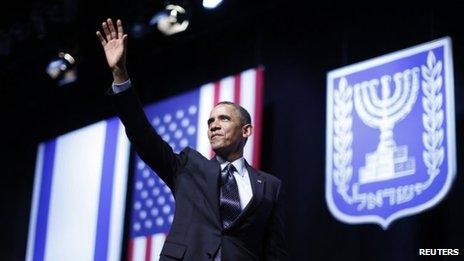President Obama gives peace a chance
- Published
- comments

President Obama laid out his case for a two-state solution in the Middle East
US President Barack Obama came with a desire to inspire. As at home, he reached over the heads of the politicians to the people.
He has made a clever speech invoking passion, morality and Jewish history to argue for a new peace process.
But cynics may note no-one doubts he is good with words. Good at painting a big, visionary picture. The cynics - and they abound in this region - may reflect that he is sometimes less adept at turning his moral vision into practical politics.
There will also be the suspicion that Mr Obama is ticking a box.
Many, including UK Foreign Minister William Hague, have warned that the door is closing for the chance of two states, Palestine and Israel, living side by side in peace.
No president wants this idea - the two-state solution - to die on his watch.
So a bit of energetic, over-optimistic resuscitation cannot do him any harm, even if the patient does pass away.
'Zionist dream'
It is perhaps wrong to be too cynical. I have no doubt Mr Obama means all this. It is more a question of whether he can achieve anything.
President Obama: "Negotiations will be necessary, but there is little secret about where they must lead. Two states for two peoples"
The speech was well-crafted and audacious. It pressed lavish praise of Israel into service to argue for peace.
He spoke of the meaning of the Passover to African Americans, another people once enslaved in a foreign land, yearning for freedom.
He lauded Zionism, saying: "People deserve to be free in a land of their own."
He did not yet say that this applied to the Palestinians too.
First, he declared that those who rejected Israel's right to exist might as well deny the sky above them or the earth below, a phrase with something of a Psalmist ring, external to it.
Boldest of all, he said that a Palestinian state would "permanently secure the Zionist dream".
President's legacy
This may sound a bit woolly and philosophical, but it is a wrapped-up warning.
If, because of the growth of settlements, more and more Palestinians abandon the two-state solution, the only place they have to go is a one-state solution.
That is, by dominating a larger Israel by demographics and a civil rights movement demanding equality and democracy.
That might take a long time but it could happen, and the end result would not be a Jewish state.
It can seem that Mr Obama is never happier than when tracing the moral arc of the universe, external, but he is trying to inject a note of urgency, saying that in a region that is growing ever more unpredictable, peace becomes harder to make as time passes.
Most experts on the region are pessimistic about the chance of talks starting up soon.
But a senior advisor says that Mr Obama is not - his conversations here have given him "a lot of confidence".
He is urging the parties build trust and then get down to the tough stuff pretty quickly - dealing with the fundamentals such as borders, refugees and the status of Jerusalem.
The new US secretary of state, John Kerry, is key to all this. He will be back in Israel at the weekend, seeing if any of the parties will make good their public commitments.
Mr Obama will soon be home and turn his attention to the domestic front.
But this speech will be part of his legacy, for good or for ill. Will he be seen as a man who promised so much and delivered so little, or one who inspired people to achieve something not short of a miracle.